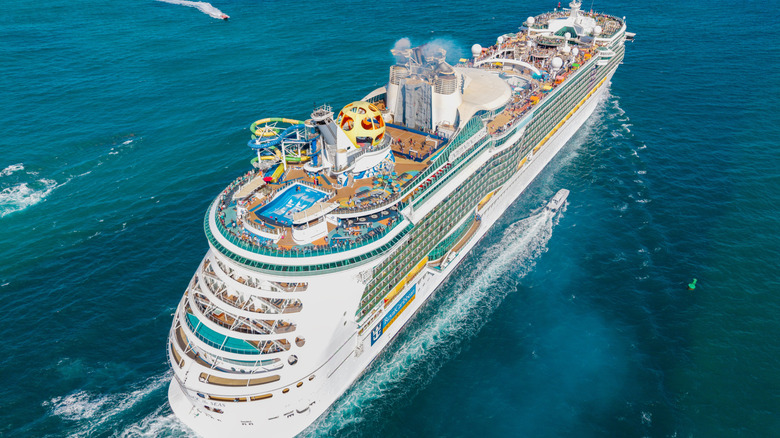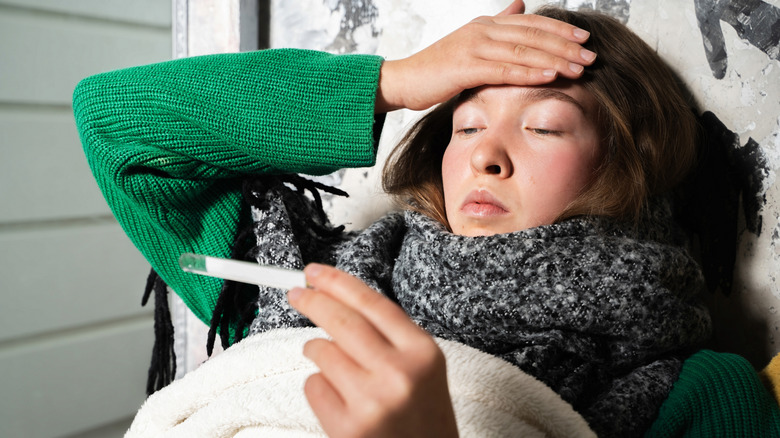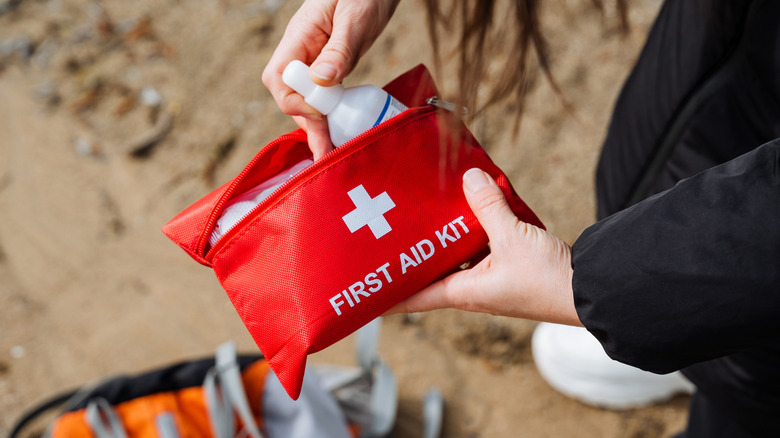Essential Steps To Take Immediately If You Discover You Have A Contagious Illness Aboard A Cruise
There's nothing quite like sailing on a cruise: You've got the ocean view, fancy buffet, and — uh oh — a contagious illness. You're essentially living in a floating building with thousands of people all breathing the same recycled air. Don't panic, though. There's a clear playbook for what to do in this situation, especially in the post-COVID era.
Cruise ships, by nature, are hotbeds for transmissible diseases. Thousands of passengers share air systems, dining areas, and handrails — a perfect setup for viruses like norovirus, influenza, and COVID-19 to spread. According to the Centers for Disease Control and Prevention (CDC), norovirus causes over 90 % of gastrointestinal outbreaks on cruise ships. In 2025 alone, the CDC's Vessel Sanitation Program has logged more than a dozen such outbreaks across major cruise lines. On one Royal Caribbean voyage this year, 134 passengers out of 3,914 (roughly 3.4%) reported vomiting and diarrhea. Fortunately, getting sick at sea is not the catastrophe it once was. Cruise lines have learned from the COVID-19 pandemic and now maintain stronger ventilation, upgraded medical facilities, and detailed outbreak management plans.
First things first: Take preventive steps before your next voyage. Get your vaccines updated, and consider wearing a mask in crowded indoor areas like theaters. In a 2024 interventional study aboard cruise ships published in Emerging Infectious Diseases, passengers who masked had an infection risk over 14 times lower than those who ditched their masks.
The medical staff will have your back
But norovirus isn't the only threat. Since 2020, COVID-19 has completely reshaped how cruise lines operate. The infamous Diamond Princess outbreak early in the pandemic infected 712 of 3,711 people onboard, or nearly 20% of all passengers and crew. The ship became a global case study in how fast respiratory illnesses can spread in confined spaces. Even today, COVID remains part of cruise health protocols. The CDC continues to classify cruise ships as "congregate settings" with elevated risk for respiratory illness spread, which is why it recommends pre-boarding health screenings, isolation facilities, and onboard testing when warranted.
If you start feeling unwell on board — coughing, feverish, vomiting, or just "off" — the first thing you should do is contact the ship's medical center immediately. Cruise lines are required to report certain illnesses (including COVID and norovirus) to health authorities, and early notification helps them act fast. Under maritime health and safety protocols, ship medical staff are responsible for evaluating sick passengers, providing care, and may request or require isolation in their cabins to prevent further spread, following cruise line policies and international health guidance. Carnival, for instance, states on its website that if guests develop symptoms of an infectious or contagious disease, they must remain in their stateroom until medical staff clear them to rejoin others. It might feel restrictive, but it's one of the best ways to stop a ship-wide outbreak before it starts.
How to take care of yourself in isolation
Once you're in your cabin, focus on rest, hydration, and hygiene. Many contagious illnesses — including mild COVID cases and norovirus – resolve within a few days with supportive care. Drink water or electrolyte solutions to prevent dehydration, especially if you're experiencing vomiting or diarrhea. Stick to bland foods if your stomach allows, and make sure you get plenty of rest. And don't underestimate handwashing: The CDC says soap and water remain the most effective defense, particularly against stomach viruses like norovirus that resist alcohol-based sanitizers.
If your symptoms include cough, sore throat, or shortness of breath, medical staff may test you for COVID-19, influenza, or RSV. Your cruise ship likely has rapid antigen or PCR tests onboard, with results typically available within hours. Additionally, the CDC has updated its isolation rules and no longer mandates a strict 5-day isolation for all COVID-19 cases. Patients on board can now end isolation once symptoms improve and at least 24 hours have passed without fever (using no fever-reducing medicine). In some cases, if multiple cases of COVID or norovirus appear, the ship may cancel excursions or even return to port early to prevent escalation.
Don't fret, though. If you're quarantined, the crew will bring food to your room. You'll still have access to medical care and can request additional supplies like masks or disinfectant wipes. In fact, there's a huge list of unexpected things one can request on a cruise ship.
Make sure isolation doesn't drive you to boredom (or insanity)
You can make those hours go by faster — and keep your spirits up — if you get a little creative with how you spend the time. First, make the most of what the ship offers digitally. Many modern cruise ships have on-demand movies, TV, or music channels in their cabin entertainment systems. If you packed your laptop or tablet, download a few shows or audiobooks for offline use before your trip; cruise Wi-Fi is notoriously expensive and not always reliable.
If you're feeling well enough, treat your cabin time like a cozy retreat. Why not start a journal? Or finally organize your travel photos on your phone? Keep your curtains open if you have a window or balcony– natural light does wonders for your mood and sleep cycle. Don't forget to move your body, too. Light stretching or breathing exercises help you avoid feeling sluggish. Some passengers even document their "unexpected sea stay" in travel blogs or private notes — it's a story you'll probably laugh about later.
Finally, stay connected. Use the ship's messaging app (most lines have one) to chat with travel companions, or call home to let people know you're okay. The goal is to rest, recover, and keep yourself occupied until you're cleared to rejoin the fun.
Packing a small cruise health kit is one of the smartest things you can do
You don't need to turn your suitcase into a floating pharmacy, but having a few over-the-counter essentials can make a huge difference if you get sick or isolated with a contagious illness at sea.
First, the basics: Bring acetaminophen (Tylenol) or ibuprofen (Advil, Motrin) for fever, headaches, and body aches. These are generally safe for mild fevers caused by viral or respiratory infections, including COVID or flu. Cruise medical centers often carry them, but they'll charge more than your local drugstore. If you're prone to motion sickness, pack dimenhydrinate (Dramamine), meclizine (Bonine), or acupressure wristbands (Sea-Bands). For digestive symptoms, include antidiarrheals (loperamide, e.g., Imodium) or Pepto-Bismol, and antacids like Tums or Pepcid for indigestion. For congestion or cough, carry decongestants (pseudoephedrine or phenylephrine), antihistamines (loratadine, cetirizine, or diphenhydramine), and cough drops. A small saline nasal spray helps in dry, air-conditioned cabins. For mild sore throats, throat lozenges and honey packets (yes, really) can soothe. Just remember: Over-the-counter drugs are legal on cruise ships, but controlled substances (such as codeine or certain sleep aids) can trigger issues in some ports. When in doubt, check your cruise line's health FAQ or the CDC's cruise travel guidance before packing.
Finally, some cruise lines waive fees or issue partial refunds under certain health circumstances. Some might even offer refunds if you get COVID shortly before your trip, as it would be wise to avoid boarding a "congregate setting" like a cruise if you have a contagious illness.




